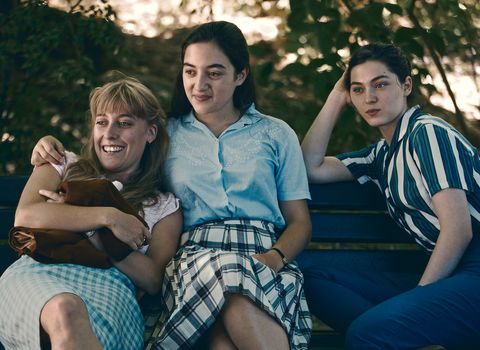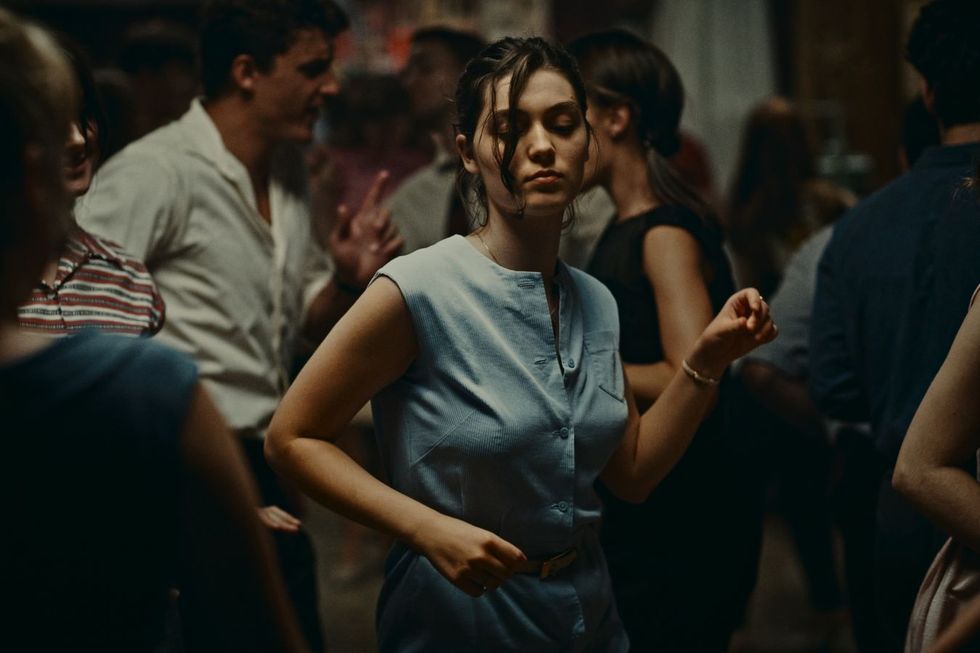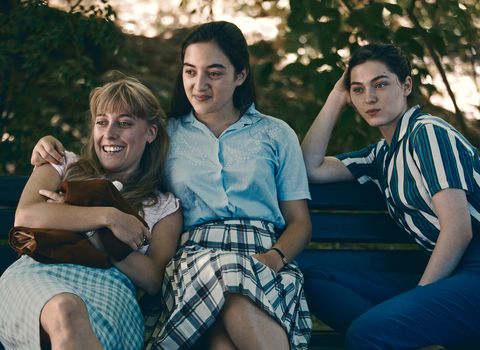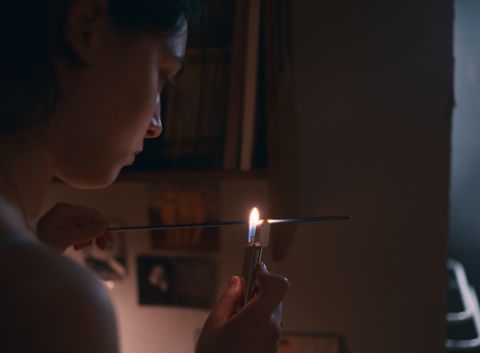French Film Happening Isn’t Just About Abortion—It’s About Freedom
“I really believe that there is a strong relationship between the most intimate thing and the most political,” says director Audrey Diwan. Her film Happening (now in theaters; streaming June 21) follows an ambitious high schooler, Anne, who faces an unplanned pregnancy in 1960s France. In choosing to get a covert abortion, Anne risks everything—her relationships, her life—for a shot at a brighter future. Given the recent leaked Supreme Court decision set to overturn Roe v. Wade, Happening feels all too timely in its telling of a young girl’s quest for an abortion or, as Diwan puts it, her quest for freedom.
Happening is based on writer Annie Ernaux’s 2001 autobiography, which struck Diwan for its brutal honesty. Diwan couldn’t shake the stark differences between Ernaux’s experience and her own medicalized abortion. “I realized how lucky I was being born in 1980,” she tells ELLE.com. “Illegal abortion is filled with randomness. Who is the woman going to meet? Is this person going to help her or turn her in to the police? Is she going to end up in jail? Is she going to survive or die?”
Ernaux’s book stayed with Diwan for a year and a half before she began writing the screenplay. As it revealed itself, the story became one not so much about abortion, but about a driven girl’s desire for sexual and intellectual freedom. This is where Diwan drew inspiration from her own life. She and co-writer Marcia Romano discussed how best to bring sexuality into the story. “It’s part of our lives,” Diwan says. “Why should we be ashamed? I think that pleasure is beautiful, and the shame is a social product.” So, she brought these subjects into the fold organically, first as a conversation between girlfriends, then in sexual imagery, then with a friend showing another how you “do it,” until finally, Anne is “ready to think about her own pleasure, to embrace it,” Diwan explains.
Happening is the kind of movie that stays with you long after it’s over, perhaps because of its intimacy and immediacy. The film’s crew, which was made up of some of Diwan’s longtime friends and collaborators, operated as a single brain. The director of photography became Anne’s shadow, pulling the focus of her eyes. Diwan approaches her subject patiently and without judgement. Her camera sits with Anne during some particularly excruciating moments in the process, making for a visceral, intensely physical viewing experience. We dwell in Anne’s silences and in her pain. That’s the point. “What if we don’t watch this girl—what if we are this girl? What if we can relate to her beyond age, beyond gender?” Diwan asks.
Embodying others’ experiences is the reason Diwan became a filmmaker to begin with. Through cinema, she says, “I’ve traveled through many lives … and I’m not the same person because it touches my psyche somehow.” She’ll pursue another woman’s story on her next project, which was announced this week: a reinvention of the ‘60s erotic novel Emmanuelle, starring Léa Seydoux. In a continuation of her work on Happening, it’s “a story told through the body.”
Diwan’s primary purpose in making Happening was to create art. But, from a political lens, she welcomes the dialogue that her film has sparked. At best, it becomes a vehicle for conversation, for opening minds. “We all know that when girls are not allowed to have legal abortions, they go illegal. This is happening, no question. The only question is how much pain we as human beings agree that girls should go through.”
In the film, those questions and confrontations are brought forth by actor Anamaria Vartolomei, in whom Diwan’s found an intellectual partner. “As a director, I want to build with the actor,” she says. Vartolomei thrived in the role’s simplicity, which served the film well, as even the smallest inkling of a smile is magnified through Diwan’s camera.
Despite the years Diwan spent on the project—writing it, pitching it, selling it, and ultimately receiving the 2021 Venice Film Festival’s Golden Lion award for it—it’s difficult for her to remove herself from the story. “When you tell the truth, you get hurt,” she says. “I remember during one sequence on set, I was very concentrated until I was crying so loudly that the sound engineer came to me and said, ‘Audrey, I’m sorry, I can’t hear anymore.’ I’m the first viewer, the first audience, of the movie. It wasn’t easy to make, for sure.”
Diwan’s portrayal of a young girl undergoing an illegal abortion is unflinching—but at no point did the director set out to make “a moral movie.” “I love the fact that the book starts, and she has already decided. So, it’s not a movie about how you make the choice. It’s about how you actually make it happen.” Partway into the film, after Anne has gone through a brutally painful abortion attempt, she defends her decision to her doctor. “I would like a child one day, but not instead of a life,” she says. Herein lies the radical earnestness of Diwan’s storytelling. It’s the story of one girl with big dreams in 1960s provincial France. But, as is the case with the most deeply personal stories, it might just be the kind of story that helps others.
“I never tried to make the movie a manifesto,” Diwan says, “but I knew that it would become organically political because I was really trying to tell the truth about that girl, and then, it becomes a story about many girls in the world.” While touring with the film earlier this month, Diwan found herself in Atlanta days before the Supreme Court leak. After the screening, a group of young girls approached her and said, “We are the girls that are going to die.” “I went back home, hearing those girls and thinking, ‘Where are the people that actually listen to them?’” Diwan says. “It was a very strange and strong moment, feeling between fiction and reality.”
This content is created and maintained by a third party, and imported onto this page to help users provide their email addresses. You may be able to find more information about this and similar content at piano.io




